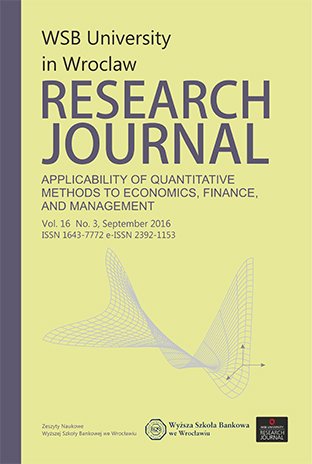O aksjomatyzacji decyzji większościowych z wetem
DOI:
https://doi.org/10.29015/cerem.225Słowa kluczowe:
aggregation of preferences, axioms, power indicesAbstrakt
W artykule przedstawiono analizę aksjomatów związanych z większościową metodą agregacji preferencji indywidualnych zarówno wtedy, kiedy konieczny jest wybór jednego z wielu wariantów jak i wtedy, kiedy konieczne jest zaaprobowanie danego pojedynczego wariantu. Rozpatrzono także wpływ na podawane aksjomaty wprowadzenie nowego atrybutu jakim jest prawo weta (bezwzględnego jak i względnego). W konkluzji podkreślono, że stosowana powszechnie metoda agregacji, tj. metoda większościowa nie jest w tym sensie metodą najlepszą.
Bibliografia
Arrow K. J. (1951): Social Choice and Individual Values, Wiley, New York.
Aumann R. J. (1985): On the Non-Transferable Utility Value: A Comment on the Roth-Shafer Examples, Econometrica, Vol. 53, No.3, 667-678
Banzhaf J. F. III (1965): Weighted voting doesn’t work: a mathematical analysis, Rutgers Law Review 19, 317-343.
Bury H., Wagner D. (2008): Pozycyjne oceny grupowe dla obiektów równoważnych [w:] Badania operacyjne i systemowe (J. Owsiński, Z. Nahorski, T. Szapiro – red.) PTBOiS, 53-64.
Condorcet, de Marquis (1785): Essai sur l’application de l’analyse a la probabilite des elections rendues a la pluralite de voix, Imprimerie Royale, Paris.
Dubey A., Neyman R. J., Weber R. J. (1981): Value theory without efficiency. Mathematics of Operations Research vol. 6, 122-128.
Gärdenfors P. (1976): Manipulation of social choice function, J. Economic Theory, vol. 13, 217-228.
Gibbard A. (1973): Manipulation of voting schemes: a general result, Econometrica, vol. 41, 587-601.
Gilboa I., Postlewaite A., Schmeidler D. (2012): Rationality of belief or: why savage’s axioms are neither necessary nor sufficient for rationality, Synthese, Vol. 187, Issue 1, 11-31.
Johnston R.J. (1978) On the measurement of power: Some reactions to Lawer, Environment and Planning A, vol. 10, 907-914.
Lissowski G. (2008): Zasady sprawiedliwego podziału dóbr, Scholar, Warszawa.
May K. O. (1952): A set of independent necessary and sufficient conditions for simple majority decisions, Econometrica, vol. 20, 680-684.
Mercik J. (1990): Wybrane problemy decyzji grupowych, Wydawnictwo Politechniki Wrocławskiej, Wrocław.
Mercik J. W. (2009): A priori veto power of the president of Poland. Operations Research and Decisions, 19(4): 61-75.
Mercik J.W. (2011): On a priori evaluation of power of veto, [in:] Consensual Processes (Herrera-Viedma et al. eds), Springer, Studies in Fuzziness and Soft Computing, 267, 145-158
Mercik J. (2015): Classification of committees with vetoes and conditions for the stability of power indices, Neurocomputing, vol. 149 (2015), Part C, 1143-1148.
Nurmi H., Uusi-Heikkilä Y. (1985): Computer simulations of approval and plurality voting: the frequency of weak Pareto violation and Condorcet loser choices in impartial cultures, European J. Political Economy, vol. 2/1, 47-59.
Ramsey D., Mercik J. (2015): A formal a priori power analysis of the Security Council of the United Nations [w:] Group Decisions and Negotiation Letters (B. Kamiński et. al. – eds), Warsaw School of Economics Press, Warsaw, 215-224.
Satterthwait M. A. (1975): Strategy proofness and Arrow’s conditions: existence and correspondence theorems for voting procedures and social welfare functions, Journal of Economic Theory, vol. 10, 187-217.
Shapley, L. S., Shubik, M. (1954), A method of evaluating the distribution of power in a committee system, American Political Science Review 48(3): 787-792.
Pobrania
Opublikowane
Numer
Dział
Licencja
Autor przenosi nieodpłatnie na Wyższą Szkołę Bankową we Wrocławiu , bez ograniczeń terytorialnych, majątkowe prawa autorskie do tego utworu w rozumieniu ustawy z dnia 4 lutego 1994 roku o prawie autorskim i prawach pokrewnych ( Dz.U. 1994, Nr 24, poz. 83 ze zm. )na zasadzie wyłączności, tj. prawo do:
a) wyłącznego używania i wykorzystania utworu w dowolnej działalności przez Wyższą Szkołę Bankową we Wrocławiu, w szczególności w działalność Biblioteki Cyfrowej uruchomionej przez Wyższą Szkołę Bankową we Wrocławiu
b) wytwarzania, utrwalania i zwielokrotniania egzemplarzy utworów wszelkimi technikami, w tym techniką drukarską, reprograficzną, zapisu magnetycznego oraz techniką cyfrową, w szczególności ich zwielokrotniania poprzez dokonywanie zapisów na płytach typu CD,
c) zamieszczenia wybranych fragmentów utworu w celach promocyjnych w publikacjach, materiałach promocyjnych, w sieci Internet oraz sieciach wewnętrznych typu Intranet Wyższej Szkoły Bankowej we Wrocławiu,
d) wprowadzania utworu do pamięci komputera Wyższej Szkoły Bankowej we Wrocławiu,
e) kopiowania i powielania utworu w technologiach fotomechanicznych lub innych znanych w dniu zawarcia umowy (fotokopie, kserokopie itp.),
f) przetworzenia dzieła na formę elektroniczną i nieograniczonego rozpowszechniania w sieci Internet.


